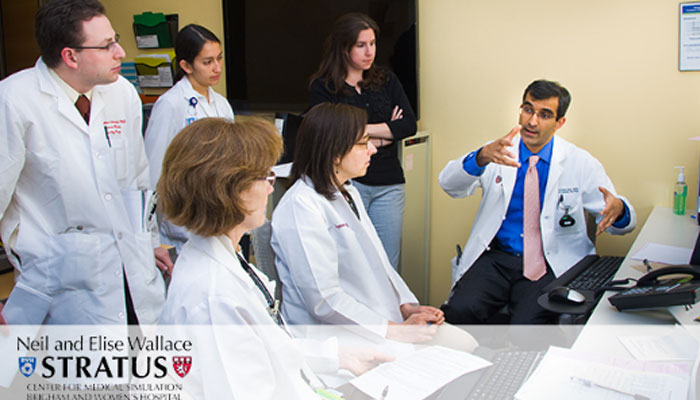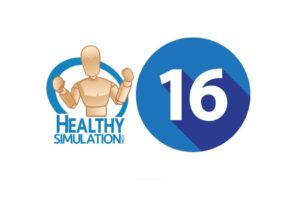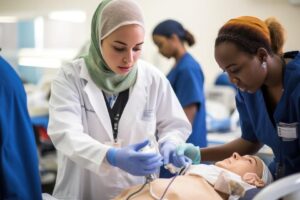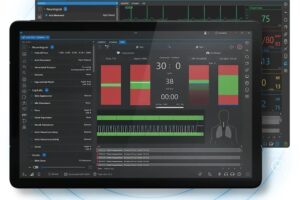Brigham and Women’s Hospital STRATUS Center Offers FREE Simulation Educators Program
CHSOS Simulation Specialist Daniel Guzman, Jr., wrote in to HealthySimulation.com to share that several of the upcoming ‘Simulation Educators Program’ courses, from Brigham and Women’s Hospital STRATUS Center for Medical Simulation, are open access and FREE! These courses which range from an exploration of reflective learning methodologies to debriefing introductions and more are perfect opportunities for healthcare simulation champions looking to immediately further their understanding of the craft. The opportunity is finite and currently only being offered on the dates below — so hurry and sign up now before this opportunity is gone!
About the STRATUS Center for Medical Simulation
The Neil and Elise Wallace STRATUS Center for Medical Simulation is committed to advancing medical education, patient safety, and healthcare outcomes through cutting-edge application of medical simulation technologies supported innovative curricula, contemporary educational methodologies, continuous improvement, and rigorous, multidisciplinary research.
Sponsored Content:
Executive Director Charles Pozner, MD shares that “STRATUS has enhanced its contributions to the establishment of robust simulation globally through our consultations with international healthcare and educational institutions and the training of an increasing number of future simulationists from around the world.”
STRATUS Simulation Educators Program
The online program suggests it will have “Clinicians leave with new practice insights and educators have opportunities to grow.” They offer many pathways for professionals to grow as an educator during COVID-19 with “virtual sessions” covering simulation education electives for clinicians-in-training.
Reserve your spot using the links below and our education team will contact you a few days prior to each session with access information:
Sponsored Content:
Clinicians as Learners: In this session, we will explore the concepts of experiential and reflective learning as they apply in the health professions. Participants will gain an understanding of how these apply for learners and educators, and apply adult learning principles to simulation-based learning. This is the foundations course for other instructor training courses.
- Target participants: Residents, fellows, attendings, and any clinician/educators.
- Level: Intro-intermediate
- When: Thursday, November 5, 2020 from 3:00 – 4:00 PM EDT
Instructional Design for Simulation: Outcomes driven instructional design is now the standard of practice for curriculum design. Participants will explore how this approach applies to the design of simulation-based learning activities. Specific attention to designing learning objectives and intended behavioral outcomes will round out the discussion of curricular design.
- Target participants: Residents, fellows, attendings, and any clinician/educators.
- Level: Intro-intermediate
- When: Thursday, November 12, 2020 from 3:00 – 4:00 PM EDT
Assessment Basics in Simulation: Differentiating and appropriately implementing various assessment strategies is an important part of any instructional session. This session focuses on formative and summative assessment strategies, and the creation of safe learning environments to promote learning. There will be an introduction of assessment approaches for each of the learning domains: Cognitive, Psychomotor, and Affective
- Target participants: Residents, fellows, attendings, and any clinician/educators.
- Level: Intro-intermediate
- When: Thursday, November 19, 2020 from 3:00 – 4:00 PM EDT
Introduction to Debriefing for Facilitators: Participants will review adult learning best-practices, and consider three basic approaches to debriefing. At the end of this session, participants will be able to describe the facilitators and barriers to meaningful learning in simulation in the context of case studies. While there will be opportunities to practice each approach, further mentorship with feedback is highly encouraged prior to engaging high stakes contexts alone.
- Target participants: Residents, fellows, attendings, and any clinician/educator.
- Level: Intro-intermediate
- When: Wednesday, October 28, 2020 from 12:00 – 1:00 PM EDT
- Or: Thursday, December 3, 2020 from 3:00 – 4:00 PM EDT
Maximizing Skills and Procedural Training: The psychomotor or skills learning domain is one of the three main learning domains in simulation-based learning in the health professions. This session reviews the theoretical and practical aspects that underpin the best practices in managing skills and procedural learning. Effective use of feedback in this content will be discussed.
- Target participants: Residents, fellows, attendings, and any clinician/educator.
- Level: Beginners and refreshers
- When: Wednesday, November 4, 2020 from 12:00 – 1:00 PM EDT
- Or: Thursday, December 10, 2020 from 3:00 – 4:00 PM EDT
Learn More & Register for Free on the BWH STRATUS Website!
Lance Baily, BA, EMT-B, is the Founder & CEO of HealthySimulation.com, which he started while serving as the Director of the Nevada System of Higher Education’s Clinical Simulation Center of Las Vegas back in 2010. Lance is also the Founder and acting Advisor to the Board of SimGHOSTS.org, the world’s only non-profit organization dedicated to supporting professionals operating healthcare simulation technologies. His co-edited Book: “Comprehensive Healthcare Simulation: Operations, Technology, and Innovative Practice” is cited as a key source for professional certification in the industry. Lance’s background also includes serving as a Simulation Technology Specialist for the LA Community College District, EMS fire fighting, Hollywood movie production, rescue diving, and global travel. He and his wife Abigail Baily, PhD live in Las Vegas, Nevada with their two amazing daughters.
Sponsored Content:


















